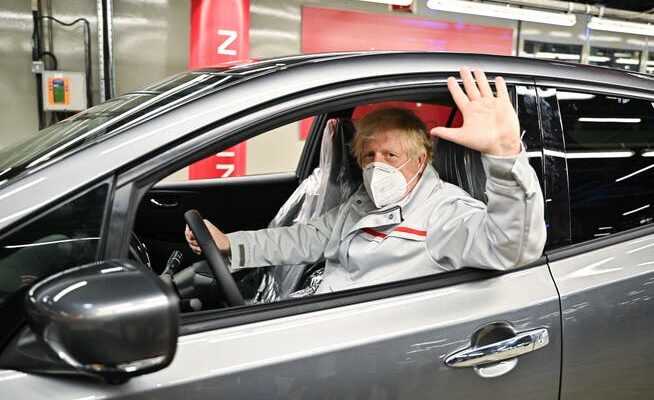The rising cost of living is a big issue in the UK. The economic recovery from the corona pandemic quickly lost momentum again.
The shortage of semiconductors means that fewer cars will be registered in the UK this year than in 1988. British Prime Minister Boris Johnson visited the Nissan factory in Sunderland last year.
At first glance, UK economic growth only slowed in the first quarter. The increase of 0.8% reported by the ONS statistical office looks respectable. Economists had on average a little more on the bill. But the true extent of the deceleration only becomes apparent when looking at the monthly data that was also presented. They show that things were still moving quickly in January. However, gross domestic product was already stagnating in February, and by March it had already fallen by 0.1%.
The downturn could result in a recession
British economic output is back to pre-pandemic levels, but is beginning to slide again. The Bank of England is still reluctant to use the word “recession”. The economists at the National Institute for Economic and Social Research NIESR, who work with similar calculation models, have already predicted a “technical” recession for the second half of the year, i.e. two consecutive quarters of contraction.
The economic recovery from the exit restrictions to contain the corona virus, which began in spring 2020, had already lost momentum faster than hoped. In July last year, the high level of sick leave caused by the Delta variant pushed growth below zero. In December, it was the Omikron variant that caused gross domestic product to fall. Then the rapidly rising inflation rate came to the fore, especially the skyrocketing energy prices.
The auto industry is suffering
On February 24, Russia invaded Ukraine. The proportion of UK businesses worried by the resulting chaos in commodities markets rose to more than a quarter in March from around a fifth in February. The distortions in the global supply chains have not yet been smoothed out either. March is actually the strongest month of the year for the British car industry, accounting for around a fifth of new registrations.
But semiconductor shortages ensured that fewer cars came onto the road this year than in 1988. This shows what “challenges” still lie ahead for the industry, said Mike Hawes, head of the SMMT automobile association. The industry was also affected by procurement problems in April. The association then reduced its estimate for the year as a whole from 1.89 million to 1.72 million newly registered passenger cars. “The latest snapshots of the UK economy are like slow-motion stills from a disaster movie you’ve already read the reviews about,” says Hargreaves Lansdown analyst Susannah Streeter.
Rising living costs are a major topic in the domestic political debate in Great Britain. Recent data are contradictory in this regard. Retail sales fell 1.4% in March as consumers became more price sensitive. On the other hand, the hotel and catering industry still made a positive contribution to economic growth in March. It is important that the composition of the gross domestic product has changed. While private consumption is almost back to the level it was before the outbreak of the pandemic, corporate investments are almost a tenth lower.
Firms do not respond to subsidies
The companies did not allow themselves to be lured out of their reserves by the «super-deduction». It allows companies to deduct 130 percent of the acquisition cost of certain capital goods from taxable profits by the end of March 2023. The reluctance to invest does not bode well, although the latest flash surveys of purchasing managers in the service and manufacturing sectors still point to expansion. From the point of view of the investment manager Aegon Asset Management, the scenario priced in on the financial market, according to which the central bank will raise the key interest rate by 100 basis points to two percent by the end of the year, is becoming “increasingly unlikely” due to the latest growth data.
